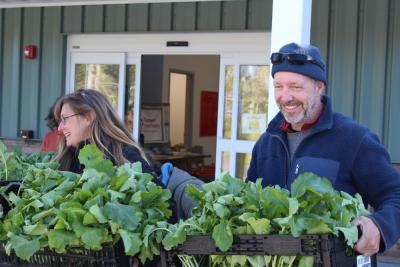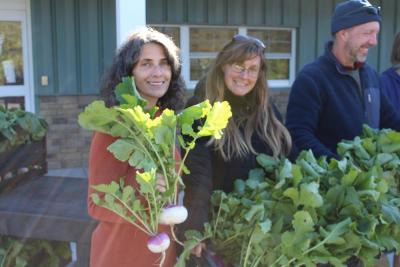Damien's Food Pantry partners with Marion Institute to fight food insecurity
In an effort to fight food insecurity and increase access to healthy, local food, Damien's Food Pantry has partnered with the Marion Insitute's Frogfoot Farm.
On Wednesday, Oct. 16, over 90 pounds of locally grown turnips and radishes arrived at Damien's as Frogfoot Farm donated 100%of its first ever harvest to the food pantry.
The mission of the farm is to help increase access to local, fresh produce by donating every crop they harvest to local food pantries. Marion Institute Executive Director Liz Wiley explained the donation to Damien's marks an important step in providing the region with local, healthy food.
"This project is really three years in the making," said Wiley. "We didn't think that we were going to have a crop this year and to see this come in and to see the partnership with Damien's is kind of a dream come true."
Wiley explained partnering with Damien's will help the farm get more local produce to people in the region for two reasons: The first being many people in the surrounding area receive food directly from Damien's and the second being many other smaller food pantries stock their shelves with donations from Damien's.
According to Executive Director of Damien's Food Pantry Rachel Resendes, partnering with the farm will allow Damien's to continue to supply the community with high quality, healthy produce.
"Oftentimes when families are in need they end up getting the 'leftovers' and this is a way for people to get something fresh and local that might not be in their price range otherwise," said Resendes.
Chair of the board of directors for Damien's, Anita Rigassio-Smith added "When food is stored and shipped it gradually loses nutritional value so I think the clients will get a more nutrient rich source of food."
Growing produce to donate to local food pantries like Damien's is only part of the mission of the farm. Wiley explained the farm is also working to establish a staff of regional gleaners.
"Gleaning is the process of training volunteers to go to other farms and harvest crops," said Wiley for a previous Wareham Week article. She added some farms don't have the time or help to harvest crops and she would send trained gleaners to harvest crops that would otherwise not be collected.
Wiley added once the farm is fully "up and running," she hopes to be able to harvest 50,000 pounds of food annually and collect another 200,000 pounds annually once the regional gleaning program is fully established.















